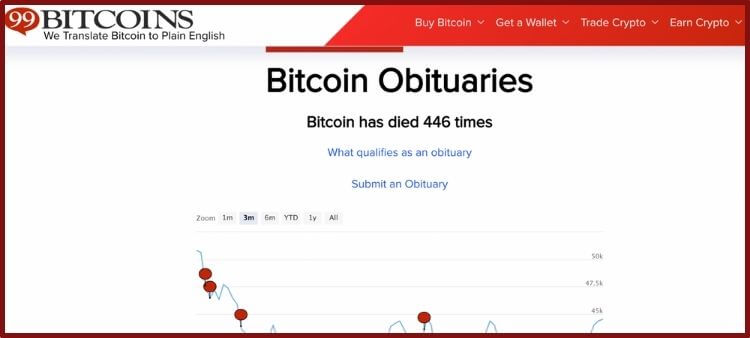Whatever business you’re involved in, you’ve probably heard the phrase: “Easy to buy, hard to sell.”
The same is true for investing.
Especially crypto investing.
Since crypto prices are so volatile, you’ll probably be tempted to pull out multiple times throughout the year.
Some people can’t handle the pain of losing so much, while others wonder when they should “ring the register.”
Heck, even when your tokens are stagnant, you may be wondering whether to pull out and chase a hot new altcoin.
If you’re seriously thinking about selling your crypto, you should sit back, breathe, and focus on the tips I’m about to share.
Remember that I’m not a financial advisor, nor is anything below financial advice.
I’m just another investor on the Internet with a passion for crypto education!
In this post, I’ll share a few general principles investors could use to decide when to sell crypto.
When To Sell Crypto? — What To Consider Before Slamming The “Sell” Button.
Review Why You’re Getting Into Crypto
So many people FOMO into crypto thinking they will be billionaires overnight.
Reality check: Few people make a ton of money just one day into their crypto career.
Of course, you could make sick gains in the crypto game, but you need to prepare yourself for extreme price swings.
You also must have a clear investment strategy before jumping into these wild markets.
Just as you would with companies on the stock market, you need to review the fundamentals of the cryptocurrencies you’re interested in.
Look into factors like the token’s developers, roadmap, and total circulating supply.
Also, remember that specific tokens are riskier than others.
For instance, Bitcoin and Ethereum have different risk profiles versus a tiny token like Floki Inu or Telcoin.
After determining which crypto projects you’re comfortable with, you have to figure out how long you want to be in the crypto market.
Are you looking for a quick trade or a long-term investment?
What’s your time horizon?
Long-term investors should consider spreading out their buys to lower their cost basis.
For short-term traders, be sure you know how to set stop losses to preserve your capital.
You also need to know how much you’re willing to lose.
Please never throw more money than you could afford to lose into the crypto market.
If you have all of this data beforehand, it will take a lot of emotion out of investing in cryptocurrency.
Just stick to your plan!
While it may sound simple, having a solid investment strategy helps you determine when to sell crypto.
So, What Will You Do With All Of That Fiat?
If you’re hesitant to sell your crypto, ask yourself what you’d do with all the dollars you’d get in your account.
Are you going to re-invest into another project, or will you transfer that money into the bank?
If you don’t need the cash to survive, remember you’ll only take a loss when you sell your crypto.
There’s always a chance your coins could come up if you can hold through the pain.
You only “lose” when you hit the sell button.
Unless, of course, you’re confident the token is going to zero!
Please be sure taking your money out of crypto will pay off more than just holding your tokens and dollar-cost averaging down.
Beware The Bitcoin Taxman! — Considering Crypto Taxes
Crypto investors must remember these digital tokens aren’t legal tender (except in El Salvador!).
While crypto taxes vary from country to country, most places require investors to pay short-term or long-term capital gains.
So, when you sell a token for profit, you have to set a little aside for the taxman.
Always calculate these taxes into your total returns when contemplating a sale.
On the flip side, please remember you can claim losses when selling cryptocurrency.
However, you don’t pay taxes to buy and “hodl” tokens. It’s only when you sell that the tax collectors will pester you for their percentage.
Please figure out the short-term and long-term capital gains rates in your state and your income bracket.
If possible, speak with an accountant who knows all about crypto taxes.
You should also research professional crypto tax software like CoinTracker that will help you calculate your gains and losses each year.
Knowing your tax fees beforehand could help you determine whether it’s worth it to sell your crypto.
Ask Whether Your Crypto Projects Are Still Legit
Just because a crypto project faces negative headlines doesn’t mean it’s “dead.”
Heck, dozens of journalists have said Bitcoin was going bust for over a decade…and look at where it is today!
Of course, there are scams and rug pulls in crypto, and not all projects will make it.
However, you can’t let FUD dictate your investment decisions.
You should know the details of your crypto tokens and have conviction in their vision.
Just because your coin is underperforming doesn’t mean the project is no longer viable.
Please always consider the fundamentals of your coin over media-driven hype.
Be extra cautious about selling a coin if you still feel the project is legit.
Consider Automating Your Crypto Trading With Bots
If you can’t pull the trigger on your short-term crypto trades, you may want to consider trading bots.
Since these programs run on algorithms, they won’t make rash decisions with your cash.
The greatest benefit of using a trading bot is they take a ton of emotion out of your trading strategy.
While crypto bots can’t guarantee you’ll make riches, they can add precision and protection to your portfolio.
Just be sure whatever crypto bot you’re buying has a good reputation.
Ideally, a crypto bot company should give you a free trial or beginner account on their site.
You should also check sites like TrustPilot to see what others say about each crypto bot brand.
Luckily for you, I’ve put together a list of high-ranking crypto bots.
Please read my post on the “Best Crypto Bots for Coinbase Pro” for more details.
Speaking of Coinbase Pro, please follow this link if you need a Coinbase account.
Follow A Few Crypto Experts You Trust
Sadly, there are a ton of scammers in the crypto industry.
Many crypto “influencers” on social media may seem like they want to help you, but they only want to rip you off.
So, I’d be extra skeptical when someone over the Internet tells you when to sell your crypto.
Even me!
It’s your money on the line, so you have to make the right decision for your situation.
Nobody can ever force you to sell your crypto, so please make sure you feel comfortable with the decision.
However, you don’t have to be “paranoid” about seeking out advice on the crypto markets.
There are many reputable crypto experts and sites that put out great content.
For instance, YouTubers like the Coin Bureau, CryptosRUs, and BitBoy Crypto have built a considerable following and good track record.
A few sites with a long reputation for crypto news and analysis include Cointelegraph, CoinGecko, and CoinMarketCap.
You could also find a ton of information on the official help pages for most major exchanges, including:
So, if you’re having difficulty choosing when to sell your crypto, consider using the resources on all of these sites.
You may not jive with every crypto website or YouTuber, so take your time finding the experts you trust.
While you shouldn’t overly rely on what anyone else says, you could use their experience to inform your investing strategy.
Sell Your Crypto When You Want To!
Selling crypto may seem simple, but there are a lot of factors to consider.
Honestly, the only way to know when it’s right to offload your tokens is to have a clear goal.
Understand the projects you’re investing in and figure out how long you want to be involved with them.
You should feel comfortable with either your gains or losses when you choose to sell out.
You should also consider any tax implications involved in selling your crypto.
Unfortunately, that’s about as specific as I can get with crypto selling advice!
Since selling is a personal decision, there’s no “right or wrong” answer.
If you feel like selling a particular token is right for your financial goals, you should go for it.












